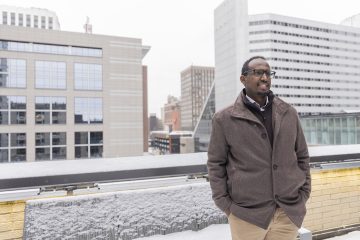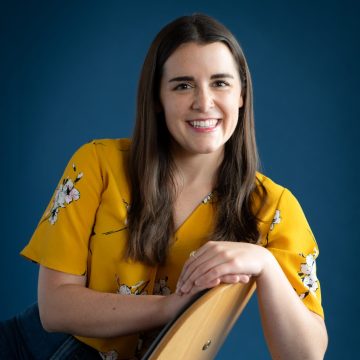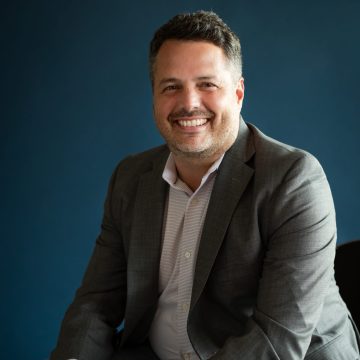Story
An Innovative Approach
Bush Fellow Mukhtar Ibrahim’s Sahan Journal uses a donor-driven financial model to spotlight stories often overlooked by other news outlets
DATE
February 24, 2022

It was half past midnight in downtown St. Paul, and Mukhtar Ibrahim (BF’16) was tired but satisfied. He had just driven away from the coworking offices that double as the newsroom for his startup media venture, Sahan Journal, and the highway before him stood dark and empty beyond the city lights fading into his rearview mirror.
His goal on the previous day’s Give to the Max Day, an annual statewide tradition of giving to nonprofits and charitable organizations, had been to raise $20,000 for one of Minnesota’s newest digital-only news operations. And with a few minutes to spare, he’d reached it. On that new November morning, his wife and three young daughters were at home sleeping, something the Somali-born newsman doesn’t get to do much these days.
Sahan Journal in its mission statement bills itself as the “only independent 501(c)(3) nonprofit digital newsroom fully dedicated to providing authentic news reporting for and with immigrants and communities of color in Minnesota.”
Sahan Journal in its mission statement bills itself as the “only independent 501(c)(3) nonprofit digital newsroom fully dedicated to providing authentic news reporting for and with immigrants and communities of color in Minnesota.” As founder, publisher, CEO and chief fundraiser, Mukhtar has had to sell that mission far and wide to support his donor-driven news model. Unlike many other news outlets, his operates without an online paywall or paid subscription requirement, but still manages to employ a staff of beginning, mid-career and veteran journalism professionals.
“I studied the nonprofit news landscape across the country and saw some successes,” says Mukhtar, a 2016 Bush Fellow. The prospect of providing an “accessible way people can come to our website without hitting a paywall” spoke to him, as did the opportunity to tell stories that larger news outlets often can’t or won’t.
A dapper dresser who knows how to flash an engaging smile, Mukhtar himself has become a brand ambassador of sorts for the very concept of representation in the media. Based largely on his skills as a journalist and a salesman, Sahan Journal earned the support of the St. Paul and Minnesota Foundation and other foundation partners while it was still a concept on paper. Has the journey been satisfying? Yes. Exhausting? Without a doubt.
An Immigrant Journey Into Online News
An observant Muslim, Mukhtar goes to mosque and prays five times daily. Throughout the summer, he plays soccer with friends. “My family really keeps me busy,” he says. “My parents are here. They’re elderly.”
Mukhtar’s own immigrant journey began with civil war. His parents, farmers, left Somalia when he was still an infant and made their way through East Africa. He lived in Ethiopia as a child, though his fondest memories are of his adolescence in Kenya, where he was constantly surrounded by friends and cousins.
“Life here is more disconnected,” Mukhtar says. “You don’t see your friends and family that often. And of course, there’s the snow.”
Mukhtar was still a teen when his parents followed his older brother to snowy Minnesota and moved into the Mount Airy High Rise Apartments, public housing situated by the interstate between downtown St. Paul and the Minnesota State Capitol building. He quickly bonded with classmates at St. Paul’s Central High School over soccer and then moved on to Inver Hills Community College, where he studied math and chemistry while working at a downtown St. Paul parking ramp. While other workers listened to the radio, he’d read the Sunday Pioneer Press newspaper to pass the time.
His family assumed he would follow his brother’s footsteps toward medical school, and for a while, he assumed the same.
“I found English courses more challenging and more thrilling,” Mukhtar says. “You’re producing something. That creative aspect, I really enjoyed that part. You struggle sometimes, looking at a blank screen, and it might take a couple hours or even a couple days. In calculus, you memorize the formula, and as long as you study, you could easily get an A.”
After transferring to the University of Minnesota, he soon put the chemistry books aside and began taking journalism classes. “I struggled early on, and really questioned if journalism was the right choice,” he says. “I wasn’t seeing people who looked like me in those classes, and I wondered why that was the case.”
A mentorship program at the university had asked him to identify a journalist he admired. The name that came to mind was Laura Yuen, who at the time was covering the immigration beat for Minnesota Public Radio, including the Muslim community. She is now a columnist with the Star Tribune. “You’re listening to the radio, and you hear the call to prayer. She’s visiting mosques and coffee shops, and there were Somali words here and there on the radio,” he says. “It was really powerful.”
Before long, they were sitting down regularly for coffee. “He was just so curious about the reporting process, about how to get people to talk, and how to center community voices,” says Yuen, who has sometimes turned to Mukhtar for career advice. “The first time we met for coffee, we ended up talking for quite a long time, and I just knew he was going to be going places. It felt more like a friendship, honestly. Mukhtar didn’t need a lot of guidance.”
The two were soon paired together on stories. His adviser, Gayle “G.G.” Golden, recommended him for an internship at Minnesota Public Radio, and his groundbreaking reporting on young Somalis recruited by ISIS, or the Islamic State, to fight in Syria soon helped him get hired onto the radio station as a digital reporter. He was suddenly one of the first Somali Americans in Minnesota to report full time for a major media outlet.
“He was able to provide some cultural perspective that we were severely lacking at the time,” Yuen recalled. “I remember door-knocking with Mukhtar and going into the community, and doing these interviews that for the most part had been closed off to us. … It just became instantly obvious what an asset he was from day one.”
Bush Fellowship Sparks Sahan Journal
In his limited free time, Mukhtar had already started working on a beta version of Sahan Journal in 2013, focused at the time on the Somali community. He began learning graphics and web design, obtaining a certificate in interactive media from Minneapolis Community and Technical College in 2016.
Mukhtar was eager to hone his craft and produce more printed copy, and a Bush Fellowship that same year offered the opportunity to obtain a master’s degree in journalism from Columbia University in New York City, even though it meant being far from his wife, young children, and elderly parents for weeks at a time.
“The Bush Fellowship helped me to dream big,” Mukhtar says. “It was the catalyst that started me on this course. In my application, I mentioned I wanted to start something that would tell the stories of immigrants. Just seeing how these communities are covered, and the few stories about them, I felt there was a gap, and I wanted to help fill that gap … especially for communities that have been overlooked and sometimes misrepresented in the local media.”
In addition to long-form reporting, Mukhtar used his Bush Fellowship to complete a summer program on data journalism, where he learned the programming language Python and other digital tools that would lend themselves to his startup.
Sahan Journal held its soft launch in the summer of 2019, a few months before COVID-19 became a household word. At a time of deep upheaval in the industry, and against a backdrop of the pandemic and racial tensions that erupted after the murder of George Floyd in Minneapolis, starting a new news operation could have been disastrous. Instead, it’s affirmed his mission.
Floyd’s murder touched off days of protests and riots in May 2020. Rather than simply cover the murder trial of former Minneapolis Police Officer Derek Chauvin, Sahan’s reporters hosted community discussions “about what justice would actually look like for Floyd and the community, whether jurors genuinely represent the community, and how racism is literally making us sick,” wrote Mukhtar, in a December 2021 newsletter to subscribers.
Sahan Journal’s coverage of the pandemic includes a multimedia video series backed by the nonprofit health plan UCare urging COVID-19 vaccinations through testimonials from doctors and medical professionals in English, Spanish, Hmong, Oromo and Somali.
The Institute for Nonprofit News, which is linked to more than 300 news outlets, recognized Sahan Journal as “Startup of the Year” in 2021 for its innovative fundraising models. Mukhtar also won the institute’s inaugural “Emerging Leader of the Year” award that year.
Other Sahan Journal stories have focused on professional Hmong soccer players, worker protests at Amazon warehouses, a Maplewood community garden that could be torn out for new housing, the Ethiopian civil war.
“He doesn’t shy away from stories that are taboos in the immigrant community,” says Na Eng, a former journalist and director of communications for the McKnight Foundation, one of Sahan Journal’s first financial backers. “Reporters have written about mental health issues, gender. Those are kind of touchy subjects, and they’re important to cover. … It’s so gratifying and so impressive what the results have been.”
“When we think about the immigrant community, we have certain tropes — immigrants are either these hard-working patriots, or you’re the bogey-man and taking up resources,” Eng continued. “The reporters at Sahan Journal are telling much more nuanced stories. If we think about the question of who belongs in Minnesota, whose lives matter, that’s answered by mainstream media in one way, and answered by Sahan Journal in a much more textured way.”
“I think it’s actually changing how other news outlets are covering communities of color,” Yuen says. “He’s changing how we all tell stories.”
The Value Proposition
If there’s been another major turning point in Sahan Journal’s evolution, it’s been the support of the philanthropic community.
“Local foundations really gave me the assurance,” Mukhtar says. “When the St. Paul and Minnesota Foundation gave us $150,000 at the beginning, that meant a lot to me. And then the McKnight Foundation and the Minneapolis Foundation all supported me. If local foundations are stepping in and giving me seed money when we’re still proving the concept, that gave me a lot of confidence to work on this really hard. The Knight Foundation followed after that. That tipped us to grow pretty quickly.”
,The Institute for Nonprofit News, which is linked to more than 300 news outlets, recognized Sahan Journal as “Startup of the Year” in 2021 for its innovative fundraising models. Mukhtar also won the institute’s inaugural “Emerging Leader of the Year” award that year. In 2019, the news operation had raised nearly $500,000 from foundations and individual donors. The next year, it raised $770,000, a more than 50 % increase. And then revenue grew again, substantially, despite the pandemic.
Mukhtar is contemplative on his “Emerging Leader of the Year” award. “I believe that leadership should be something collective,” Mukhtar says. “When you usually visualize a leader, you see someone making a decision by themselves. I don’t subscribe to that. I work with my team. We work through issues. I consult with them when I make decisions. My team, they’re doing the work, they’re part of the work. The more I consult with them, the more they feel like they have some ownership in the process.”
In January 2022, Mukhtar received the kind of New Year’s gift he once could only dream about: his media outlet would receive $1.2 million from the American Journalism Project, a Washington, D.C.-based venture philanthropy that sponsors nonprofit news across the country. The grant — Sahan Journal’s largest ever — will allow the digital news outlet to expand coverage and build relationships with grant-makers.
His pitch to donors?
“It’s very straightforward,” Mukhtar says. “We tell them the value proposition — this is a nonprofit organization dedicated to covering communities of color that have not been fully covered by the mainstream press. Immigrants and communities of color play a major role in the economy and civic life, and they should see themselves reflected in the press.”
Mukhtar’s Sahan Journal is doing just that.
Frederick Melo has been a reporter with the St. Paul Pioneer Press since January 2005. Born in New York and raised in Boston, Melo currently covers St. Paul City Hall and the “Urban Life” beat. He holds a bachelor’s degree in Political Science from Brown University in Rhode Island and began his career freelancing from Costa Rica in 1999. A father of two and recent “Girl Scout dad,” Melo enjoys foreign films, languages, world travel and international cuisine.
Jaida Grey Eagle is an Oglala Lakota artist currently living in St. Paul. She is a photojournalist, producer, beadwork artist and writer. She is a Report for America Fellow with the Sahan Journal covering communities of color in the Twin Cities and also is researching Indigenous photography at the Minneapolis Institute of Arts as an ongoing former Curatorial Fellow. She holds her bachelor’s degree of fine arts emphasizing fine art photography from the Institute of American Indian Arts in Santa Fe, NM.
Continue reading
-

News
Opportunity to work with us
As part of our office move later this year, we are exploring possibilities for the build out of the ground floor of the building. We are in the early stages of this and considering different types of operating models and potential partnerships.
-

Staff note
Coordinating the work of our contact hub
We aim to be radically open in all that we do, and that includes being more accessible to more people and sharing what we learn along the way.
-

Staff note
Making every dollar work through impact investing
We have benefitted from the experience of other funders as we developed our impact investing approach. Now we are paying it forward and sharing what we have done and what we have learned.